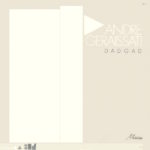
Well, this one’s a tough ‘un to describe. Meditative, elegiac, and at points quite melancholic, André Geraissati’s DADGAD is another instrumental, guitar album that uses it’s one voice to say so many things. In this case, it is André Geraissati’s wonderful fusion of Americana and Anglophilic roots music with Brazilian sambista rhythms and edgings of open-tuned “eastern” music to present the many moods of just one totemic musical tuning. Distilling his impressive technique into far more personal — around my way, on days when spring still feels so teasingly far away — it’s expressive meanderings take a special tone, forming into some special kind of thing. Is warm peppermint tea a genre? If not, that’s what DADGAD sounds like.
DADGAD, for those non-guitarists out there, is based on the guitar tuning popularized by Davy Graham, Pierre Bensusan, Bert Jansch and countless other troubadours who needed the harmonic heft of providing both melodic and harmonic accompaniment in their music. Affecting a drone, tuning down the lowest and highest string on a guitar, would allow one guitarist to both reach the scale of pianist but also the micro-bits of chord spacing and voicing that really would be impossible to easily do on a standard tuned guitar. Tune down and immediately you feel/hear the inherent modality/resonances in your normally rigid instrument. On DADGAD, André Geraissati tunes down to misremember phrasing he grew up learning, simply letting the improvisatory scale of this new tuning lead him where he had to go.
Before this release, André Geraissati had a worthwhile career backing up groups like Os Mutantes or musicians like Egberto Gismonti. We’ve even heard his contributions which build on these ideas in the work of Edson Natale and some very interesting ones (with Paul Horn, for example) I’d invite you to dig further yourself. Even though he began as a jazz boffo with the Groupo D’Alma, for some reason, I always feel some sort of special coming back to his solo. This, I believe is closest to what he had to do.
Close mic’ed and entirely self-accompanied, there is nothing else there than what is there, but the way he ekes out the so much there invites itself to much closer listening. It’s that intimate feeling that moves it beyond his influences.
Never exactly “Brazilian”, “jazzy”, or much of anything pinpointable, on good headphones, and on songs like “Vozes” you can hear the audible breathing and “feeling” André was coursing through as he played his compositions. Close to the edit, those plaintive guitar plucks that linger for so long, simply draw you in note by note in a way that might be ruined if someone else came in. For many Brazilian listeners who first encountered his releases on the WEA label, they were left plainfully impressed by someone showing another way to blue. “Verde” continues that thought. This time around, the resonating body of a guitar fills out the reverberating spaces left opened by André’s gorgeous, fretted harmonics.
Anyway, rather than waste your time trying to describe a completely acoustic instrumental album, I’d rather you take the time to place it in a context. Although the album breaks through with something composed in DADGAD, each track actually moves away from that symbolic intonation. André never does it out of willful obfuscation but because there are certain notes you can only reach outside the “tried and true”. If the truth is still not quite there — you keep pushing. Neither tried nor true, DADGAD sounds as timeless now as it must have sounded then — a fact, I’d wager, will remain the same, decades from today.
